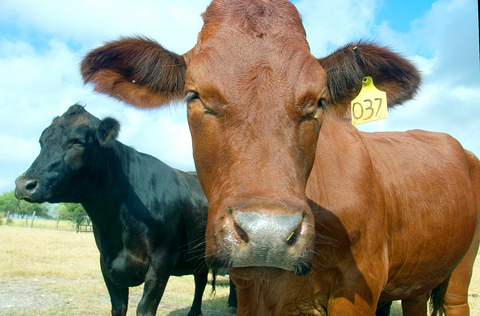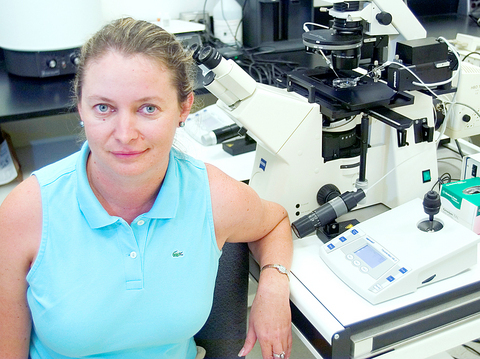About 129km east of Austin, out where the fire ants bite and men still doff their baseball hats when greeting women, 20 cows pregnant with calves cloned by ViaGen Inc have just arrived.
Stampeding down a chute from a tractor trailer, the cattle join a menagerie of cloned pigs and cows that include Elvis and Priscilla, calves cloned from cells scraped from sides of high-quality beef hanging in a slaughterhouse.
The cloning of barnyard animals has now become so commonplace and mechanized that ViaGen says it's more than ready to efficiently produce juicier steaks and tastier chops through cloning.

PHOTO: AP
It now looks like federal regulators will endorse the company's plan to bring its cloned animal products to America's dinner tables.
No law prevents cloned food, but ViaGen has voluntarily withheld its products pending a ruling from the Food and Drug Administration (FDA).
Over the past three years it has worked to create elite bovine and porcine gene pools that can produce prodigious "milkers," top quality beef cattle and biotech bacon. It has aggressively gobbled up competitors and locked up patents, including the one granted to the creators of Dolly the sheep.

PHOTO: AP
All that currently stands in ViaGen's way, besides a nod from the FDA, are squeamish consumers and skeptical food producers.
The FDA is widely expected to soon endorse the findings of a 2002 National Academy of Science report it commissioned that found the food products derived from cloned animals do not "present a food safety concern."
Acknowledging the many critics who have raised ethical objections as well as safety concerns, the FDA commissioner said on Sept. 19 that "within weeks" the agency was prepared to publish results of its examination of the issues in a scientific journal -- a rare move for the agency, which used a similar forum to make public its position on genetically modified crops in 1992.
But then the commissioner, Lester Crawford, abruptly resigned, leaving the top ranks of the FDA in turmoil.
FDA spokeswoman Rae Jones said in an e-mail sent on Wednesday that Crawford "was talking about a draft risk assessment that the FDA is now preparing to release. This release was not related to commisioner Crawford or his recent resignation."
But Jones said "we do not have a timeline" for the assessment's release.
So, without a government cloning endorsement, the deep-pocketed corporate customers ViaGen hopes to court are staying on the sidelines.
"The National Milk Producers Federation does not at this time support milk from cloned cows entering the marketplace until FDA determines that milk from cloned cows is the same as milk from conventionally bred animals," said Chris Galen, a spokesman for the trade group, which represents the US$23 billion dairy industry.
Dairy farmers worry that without federal government's blessing, US consumers will blanch at pouring milk from cloned cows on their breakfast cereal.
Beef and pork producers have similar concerns.
A March survey by the International Food Information Council, an industry trade group, reported that 63 percent of consumers would likely not buy food from cloned animals, even if the FDA determined the products were safe.
Rapid advances in genetic technology are increasingly being applied further up the food chain.
It's one thing for traditional crops like corn to be engineered to be pest-resistant, and people already eat genetically engineered soy beans in all manner of processed food.
But biotech companies run into what bioethicists call the "yuck factor" when they begin tinkering with animals.
An application to market salmon genetically engineered with genes from other fish to grow faster has been formally pending with the FDA for more than two years.
That's why ViaGen insists that its work has nothing to do with combining genetic material of two different species. It likens it to now common reproductive technologies such as in vitro fertilization and artificial insemination.
To clone, scientists replace all the genetic material in an egg with a mature cell containing the complete genetic code from the donor. Cloners argue that the resulting animal is simply the donor's twin, containing an identical makeup, yes, but destined for its own distinct fate influenced by environment and chance.
The coat of the first ever cat cloned, for instance, was a totally different color than that of its genetic donor.
So there are no guarantees that the cloned calf Elvis will yield the highest quality beef -- the USDA's "prime yield 1" designation -- that gave him his life, but it certainly increases the odds he will produce prime meat.
As it stands, "prime yield 1" ratings come along once every 12,000 cows.
ViaGen's founder Scott Davis says knowing which cow is likely to yield premium beef could demand up to a US$250 premium per heifer, a big markup in the notoriously low-margin industry.
He said the price of a cloned cow continues to drop and, depending on the order volume, can cost as little as US$8,000 per animal.
"Cloning is at a commercially viable place now," Davis said.

Chinese Nationalist Party (KMT) lawmakers have declared they survived recall votes to remove them from office today, although official results are still pending as the vote counting continues. Although final tallies from the Central Election Commission (CEC) are still pending, preliminary results indicate that the recall campaigns against all seven KMT lawmakers have fallen short. As of 6:10 pm, Taichung Legislators Yen Kuan-heng (顏寬恒) and Yang Chiung-ying (楊瓊瓔), Hsinchu County Legislator Lin Szu-ming (林思銘), Nantou County Legislator Ma Wen-chun (馬文君) and New Taipei City Legislator Lo Ming-tsai (羅明才) had all announced they

CHAMPIONS: President Lai congratulated the players’ outstanding performance, cheering them for marking a new milestone in the nation’s baseball history Taiwan on Sunday won their first Little League Baseball World Series (LLBWS) title in 29 years, as Taipei’s Dong Yuan Elementary School defeated a team from Las Vegas 7-0 in the championship game in South Williamsport, Pennsylvania. It was Taiwan’s first championship in the annual tournament since 1996, ending a nearly three-decade drought. “It has been a very long time ... and we finally made it,” Taiwan manager Lai Min-nan (賴敏男) said after the game. Lai said he last managed a Dong Yuan team in at the South Williamsport in 2015, when they were eliminated after four games. “There is

Nvidia Corp CEO Jensen Huang (黃仁勳) yesterday visited Taiwan Semiconductor Manufacturing Co (TSMC, 台積電), as the chipmaker prepares for volume production of Nvidia’s next-generation artificial intelligence (AI) chips. It was Huang’s third trip to Taiwan this year, indicating that Nvidia’s supply chain is deeply connected to Taiwan. Its partners also include packager Siliconware Precision Industries Co (矽品精密) and server makers Hon Hai Precision Industry Co (鴻海精密) and Quanta Computer Inc (廣達). “My main purpose is to visit TSMC,” Huang said yesterday. “As you know, we have next-generation architecture called Rubin. Rubin is very advanced. We have now taped out six brand new

POWER PLANT POLL: The TPP said the number of ‘yes’ votes showed that the energy policy should be corrected, and the KMT said the result was a win for the people’s voice The government does not rule out advanced nuclear energy generation if it meets the government’s three prerequisites, President William Lai (賴清德) said last night after the number of votes in favor of restarting a nuclear power plant outnumbered the “no” votes in a referendum yesterday. The referendum failed to pass, despite getting more “yes” votes, as the Referendum Act (公民投票法) states that the vote would only pass if the votes in favor account for more than one-fourth of the total number of eligible voters and outnumber the opposing votes. Yesterday’s referendum question was: “Do you agree that the Ma-anshan Nuclear Power Plant